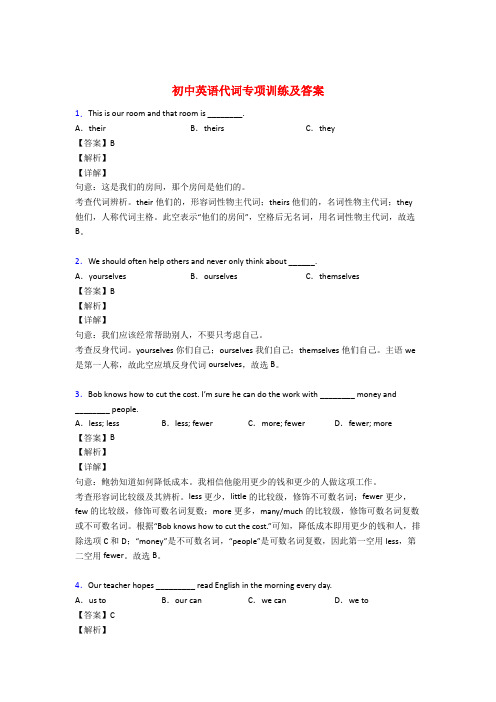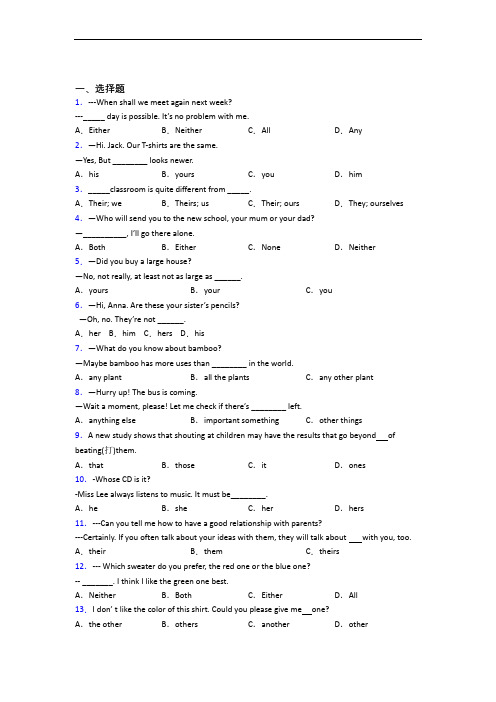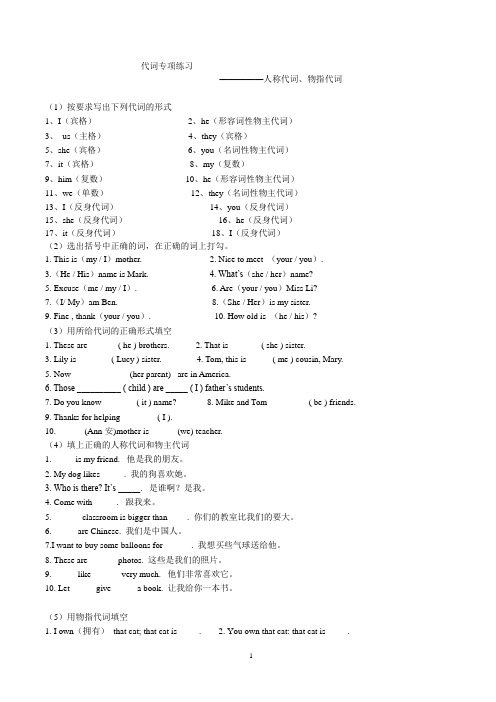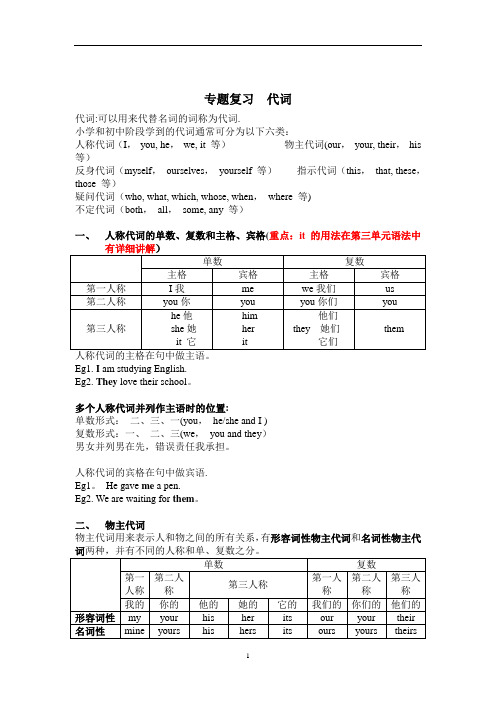最新初中英语语法知识—代词的知识点训练
七年级英语重点—代词的用法及训练题(附答案)精选全文

七年级英语重点—代词的⽤法及训练题(附答案)代词练习⼀、⽤适当的代词填空1.We like ________ (he, his , him) very much.2.Is this guitar ________ (you, your, yours)?3.________(She, Her, Hers) name is Li Li.4.Father bought a desk for ________ (I, my, me, mine).5.________ (It, It's, Its) is very cold today.6.Is this your book, Mike?Yes ,________(we, you, they )are.7.Are you and Tom classmates?Yes, ________(we, you ,they )are.8.Each of the students ________( have, has) a pen pal.9.He has a dog. I want to have ________(it, one ),too.10.Her parents are ________ (both, all ,either )teachers.11.The text is easy for you .There are ________( few, a few ,little, a little) new words in it . 12.I want ________( some, any) bananas. Give me these big ________(one, ones).⼆、选择正确的答案1.Is this ________ book?A.you B.I C.she D.your2.It's a bird. ________ name is Polly.A.Its B.It's C.His D.It3.What's that ?________ a jeep.A.it's B.Its C.It's D.its4.What's that in English? ________.A.It's egg B.That's egg C.It's a egg D.It's an egg5.Whose cat is this ? Is it yours? Is it a white _______?A.cat's B.one C.ones D.cats6.Please give the book to ________.A.I B.me C.my D.mine7._________skirt is yours?A.Whose B.Where C.How D.Which8.________ is this pen ? It's Wang Fang's.A.Who's B.Whose C.Where D.Which9.Kate and Mike do ________ homework in the evening.A.one's B.his C.her D.their10.There isn't ________ water in the bottle.A.any B.some C.no D.a巩固习题⼀、⽤适当的⼈称代词填空:1. __________ is my aunt. We often visit __________. ( she )2. China is a developing country. _________is in the east of Asia. ( its )3. What day is __________ today? — __________ is Thursday. (its)5. I own a blue bike. The red one isn’t __________. ( I )6. These new houses are so nice. __________are very expensive.(them )7. The fishermen caught a lot of fish, didn’t __________? ( them )8. Ling Ling is a girl.____studies in a primary school.______ brother lives with ____ and helps ____ with______ lessons. ( she )9. Mike is my classmate. ____ is good at Engliush . ( his )10. Kate wants a glass of milk. Will you pass it to ____ ? ( she )11. What’s the weather like today ? ____ is cloudy. ( its )⼆、⽤形容词性物主代词和名词性物主代词填空1. I ate all ____ sandwiches yesterday.( I ) Can I have one of ____ ? ( you )2. George has lost ____ ( his ) pen. Ask Mary if(是否)she will lend him ____ . ( she )3..Jack has a dog and so have I.____(he)dog and ____( I ) had a fight (打架).4. The teacher wants you to return that book of ____ ( he )5. Mr. and Mrs. Green and a friend of ____ are coming to see us. ( they )6. We are going to Paris to stay with a French friend of ____ . (we )7. This isn’t________knife. _________ is green. ( she )8. These are your books Kate.Put ________in the desk,please.(they )9. _______ must look after ________ things. ( you )10. Wei Fang,is that ________ ruler? Yes,it’s.( you )11. They want a football. Give __________the green one,please. ( they)12. It’s Lin Tao’s bag. Give it to __________. ( he )13. Is this pencil-box Li Lei’s? No,___________ is very new. ( he )14. This box is too heavy. I can’t carry _________. ( it )Don’t worry,Let __________( I ) help __________. ( you)15. _____is a boy_____ name is Mike.Mikes friends like _____ very much. ( he )16. My sister is in _____ room. _____ is a teacher. ( she )17. Jane is a little girl. _____ mother is a nurse. ( she )18. We are in _____ classroom. _____ classroom is big. ( we)19. My father and mother are teachers. _____ are busy ( them)20. You are a pupil. Is _____ brother a pupil, too? ( you )三. 从括号内选择正确的代词填空1. Your football clothes are on the desk.Please put _________(they,them,their,theirs) away.2. (We,Us,Our,Ours)_________ English teacher is Mrs. Green.We all like _________(she,her,hers).3. (I,Me,My,Mine)_________ can’t get my kite.Could you help _________(I,me,my,mine)?4. Tom can’t get down from the tree.Can you help _________(he,him,his)?5. We can’t find our bikes.Can you help _________(we,us,our,ours)?6. These are _________(he,him,his) planes.The white ones are _________(I,me,mine).四、⽤括号中的适当形式填空1 Are these ______(you)pencils?Yes,they are ________(our).2 Whose is this pencil? —It’s ________(I).3 I love ________(they)very much.4 She is________(I)classmate.5 Miss Li often looks after________(she)brother.6 Are these ________(they)bags ?—No, they aren’t ________(their). They are ________(we).七、选择填空.1. Mr. More has more money than Mr. Little . But he doesn’t enjoy _______.A. heB. himC. hisD. himself2. Lily was 9 years old. _____ was old enough to go to school ________.A. She , sheB. She , herselfC. Her, herselfD. Her. she3. Jim’s watch is much newer than _________.B.sheC. herD. herself4. Would you like _____for super?A: something Chinese B:Chinese somethingC: anything Chinese D: Chinese anything5. ______ piano is too old ,but she still liked playing it.A. SheB. She’sC. HersD. Her6. ——Who taught you English last year?——Nobody taught me . I taught ______.A. meB. myselfC. mineD. I7. That bike is _________?A.he B. him C. his D. it8. We bought ______ a present, but _______ didn”t like it.A. they, themB. them , theyC. themselves , theirD. theirs, they9. Who’s singing over there ? — ________ is Sandy’s sister.A. ThatB. ItC. SheD. This10. ________ will spend the summer holiday in Hawaii.A. She, you and IB. You, she and IC. I, you and sheD. Her, me an11. Between you and ________, he is not a real friend.A. meB. IC. heD. his12. My uncle bought a new bike for ________.A. theirsB. theyC. meD. I13. Here’s a postcard for you, Jim!— Oh, ____ is from my friend, Mary.A. heB. itC. sheD. it’s14. Little Baby knows that he should not take the things that do not belong to ________.A. heB. hisC. herD. him15. Will anyone go on a trip with him ? — Not ________.A. IB. meC. mineD. he16. Among those lovely toys, the brown toy dog was given by ________.A. heB. hisC. him答案:⼀、1、she her 2、it 3、it it 5、mine 6、they 7、they 8、she her her her her 9、he 10、her 11、it⼆、1、my yours 2、his hers 3、his mine 4、his 5、them 6、ours 7、her her 8、them 9、you your10、your 11、them 12、him 13、his 14、it me you 15、he his him 16、her she 17、her 18、our our 19、they 20、your三、1、them 2、our her 3、i me 4、him 5、us 6、his mine四、1、your ours 2、mine 3、them 4、my 5、her 6、their their ours七、1、D 2、B 3、A 4、D 5、D 6、B 7、C 8、B 9、C 10、B 11、A 12、C 13、B 14、B 15、B 16、C反⾝代词:1.Those girls enjoyed ____ in the party last night.A.themB. theyC. themselvesD. herself2.Help ____ to some fish, children.A. yourselfB. yourC. yoursD. yourselves3. The film ____ is very fun.A. it’sB. itselfC. itD. i ts4. –Who teaches ____ math? –I teach ______.A. your, my selfB. you, myselfC. you, meD. you, herself5.The father will make ____ a bike ____.A. her, himselfB. she, himselfC. her, herselfD. she, herself 6.6.The scarf is ____, she made it_____.A. herself, herB. herself, hersC. hers, herselfD. her, herself7.. Liu Hulan’s death was great. She thought more of others than ______.B. sheC. hersD. herself8. Luckily, he didn’t hurt ____ terribly yesterday.A. himB. themselvesC. himselfD. they9. I can’t mend my shoe _____. Can you mend it for _____?A. myself, meB. myself, IC. me, ID. I, me10. I like watching ____ in the mirror.A. meB. IC. myD. myselfKey: 1. C 2. D 3. B 4. B 5. A 6. C 7. D 8. C 9. A 10. D指⽰代词:( ) 1 Who's that at the door? ____ is the postman.A. SheB. ThisC. ItD. He( ) 2 -Who's that in the picture? A. It's me B. That's I C. This is a boy D. It's I ( ) 3 -Look, who is coming? -___ must be our English teacher.A. SheB. HeC. ItD. This( ) 4 Someone is knocking at the door, but who can____ be?A. oneB. heC. she4( ) 1 ___ was late summer and the weather was very hot.A. ThatB. ItC. ThisD. It's( ) 2 What time is ____ now?A it B. all C. this D: that( ) 3 ___ a heavy rain last night.A. There hadB. We hadC. It wasD. There is( ) 4 ___ is 200 kilometres from here to the natural park. We have to go there by car.A. ThereB. ItC. ThisD. The place3. 1-4 D A D D4. 1-4 B A B B8( ) 1 ____ is the best season of the year?A. WhenB. WhatC. WhichD. What time( ) 2 o-____ is your sister?-She is a nurse.A. WhatB. WhichC. HowD. Who( ) 3 -___ colour are your new shoes?-They are brown.B. WhoseC. WhichD. What( ) 4 -___ is your classmate John like?-He's very tall.A. HowB. WhatC. WhoD. Which9) ( )1 ____ has happened and ____ did it?A. Who; whoB. What; whoC. What; whatD. Who; what( ) 2 Who waiting outside? Please ask them to come in.A. isB. hasC. haveD. are10( ) 1 -_____ is that man over there?-He's Mr Green.A. WhatB. WhichC. HowD. Who( ) 2 -___ is the boy standing there?-He is my brother.A. WhichB. WhatC. HowD. Who( ) 3 Who ___ the little American boy over there?A. wereC. isD.1 am( )4 Who___these tall men?A. isB. amC. areD. was11( ) 1 ____ one do you like, the blue one or the red one?A. WhatB. WhichC. ThatD. This( ) 2 -___ is bigger?-The yellow one.A. whoB. whomC. whichD. It( ) 3 ___ of you would like to go with us?A. WhoB. WhichC. AllD. Both12( ) 1 -_____ bag is this?-It's Jack's.A. What B. Which C. Whose D.Who's ( ) 2 -___ pencils are these?-They are theirs.A. WhichB. WhoseC. /D. These( ) 3 ___ house is being repaired?A. hatB. WhereC. WhoD. Whose13( ) 1 Please find out ____ he is looking after at home.A. whoB. whichC. whomD. when( ) 2 ____ do you think you should help?A. WhoseB. WhichC. WhatD. Whom( ) 3 He told me ___ he was sent for.30( ) 1 The man missed the bus. ____ is why he was late for the meeting.A. ItB. ThatC. ThisD. All( ) 2 He has to stay at home. ___ he has a bad cold.A. This is becauseB. That's whyC. So is itD. The reason is( ) 3 -How many books are there on the table? Only four.A. This is all rightB. That's all rightC. That's rightD. It is all rightA.whomD. Where8. 1-4 D A D B9. 1-2 B D10. 1-4 D D D D11. 1-3 B D B12. 1-3 B D D13. 1-3 D D A30. 1-3 B A D15( ) 1 He and she are exactly as tall as____.A. themselvesB. themC. theirD. each other( ) 2 People usually put small presents in ____ stocking on Christmas Eve.A. each otherB. each othersC. each other'sD. each others'( ) 3 The students often help___.A. one the otherB. each the otherC. one anotherD. two another18( ) 1.There are shops on _____ side of the street.________ of them do not close till 12 at night.A. both; AllB. every; NoneC. either; SomeD. other; Many( ) 2 The boy runs faster than_______ in his class.,A. any of the boyB. any boys( ) 3 Tom is stronger than ___ in his class.A. any studentsB. other studentC. any other studentD. any other students( ) 4 There is not ___ meat in my bowl. There is ____ chicken in it.A. some; anyB. any; someC. any; anyD. some; some( ) 5 -I have forgotten my bread.-Never mind, you can have____.A. some of usB. some of ourC. some of oursD. many of ours( ) 6 -Is there ___ tea in' that green cup?-Yes, there is____.A. the; someB. any; anyC. some; anyD. any; some19( ) 1 Could you do___for me, please?A.everythingB.nothingC. somethingD. anything( ) 2 The bottle is empty. There is___ in it.A. anythingB. somethingC. nothingD. everythingA. somebodyB. NobodyC. EverybodyD. Anybody( ) 4 -Did you find ___ in the room?-No, we found ___ there.A. anybody; nobodyB. somebody; everybodyC. anybody; somebodyD. everybody; anybody( ) 5 I have a lot of work to do. 1 have___ time to play.A. notB. anyC. noD. some( ) 6 As we know, he is___fool.A. notB. no aC. not anD. no20( ) 1 I asked him for some oil, but he hadn't ___.A. someB. anyC. anythingD. no( ) 2 ___ of the four roads will take you to the hospital.A. NeitherB. EitherC. BothD. Any( ) 3 Would you lend me of your money? "A. someD. any( ) 4 Would you like___more coffee?A. littleB. anyC. someD. another( ) 5 -Have you any books on radio?-I'd like to borrow ___.A. thoseB. someC. themD. it21( ) 1 Listen to me. I have____ to tell you.A. anything newB. something newC. new somethingD. nothing new ( ) 2 By the way, is there ____ in today's newspaper?A. something new oB. anything newC. new somethingD. new anything ( ) 3 Please be quiet. I have___ to tell you.A. important somethingB. nothing importantC. important anythingD. something important( ) 4 I'm not busy. I haven't ____ to do.A. somethingB. everythingC. nothingD. anything( ) 5 ____ has happened, I want you to tell me about it.A. SomethingD. Nothing22( ) 1 Yesterday morning ___ boy broke into the garden.A. anyB. someC. manyD. much( ) 2 ___ twenty boys were playing football at that time yesterday.A. EachB. SomeC. No oneD. Neither( ) 3 Now I have ______ questions. Let's go to ask our teacher.A. anyB. muchC. someD. a lot23( ) 1 If you like these apples, you can take_____.A. anyB. a lotC. that .D. this( ) 2 I will do____for my motherland.A. anythingB. manyC. muchD. something( ) 3 -Did they find ___ in the park?-No, they found____there.A. anybody; nobodyB. somebody; everybodyC. anybody; somebody( ) 1 I don't know_____ of these people, for they are new workers.A. anyB. someC. oneD. much( ) 2 He didn't take ___ one. They are all here.A. manyB. anyC. a littleD. that( ) 3 1 haven't read____ of the books.A few of the books are too difficult for me to read. A. any B. some C. two D. both25( ) 1 Can I have___bottle of orange, please?A. anotherB. otherC. othersD. the others( ) 2 There are forty-four students in Class One. Nineteen of them are boys,___ are girls.A. the otherB. the othersC. othersD. some others( ) 3 Mr Smith has two sons. ____ is a soldier, ___ is a doctor.A. One; anotherB. One; otherC. This; the otherD. One; the other( ) 4 There are many people in the park now. Some are boating. ____ are walking along the lake.A. the otherB. otherC. the othersD. othersB. another oneC. .othersD. the other( ) 6 I borrowed two books. ____ is in English, and____ is in Chinese.A. It; anotherB. One; anotherC. The one; anotherD. One; the other26( ) 1 _____ of them has an English dictionary.A. EveryB. AllC. BothD. Each( ) 2 There are lots of English books here, and ____ of them is easy to understand.A. bothB. all .C. everyD. each( ) 3 I didn't know that you___would___there.A. be; allB. all; beC. are; all D: all; are( ) 4 -Are these two books interesting?-Yes, ____ of them are interesting.A. bothB. allC. eitherD. neither27( ) 1 He couldn't make himself understood because ___ of us knew what he said.A. noneB. no( ) 2 I didn't like the cross talk. ____ of the actors was funny.A. BothB. AllC. NeitherD. Either( ) 3 _____ of them is good at singing.A. BothB. AllC. No oneD. Neither( ) 4 -Which would you like, a cup of tea or a glass of milk?-____, thanks. I think I'll just have a glass of water.A. NoneB. NeitherC. BothD. Either( ) 5 -How many monkeys did you see in the zoo?A. NeverB. NoneC. No oneD. Nothing28( ) 1 We should speak English as___ as possible.A. manyB. muchC. fewD. lot( ) 2 It's going to be a busy day today. I have____ work to do.A. a hardB. a lotC. manyD. much( ) 3 The boy has eaten two bananas already, but he wanted___.C. a little moreD. little more( ) 4 Do you eat ____ fruit and vegetables?A. manyB. moreC. a lotD. a lot of29( ) 1 I didn't get any letters yesterday, but there were____ this morning.A. a littleB. fewC. littleD. a few( ) 2 The film isn't interesting. ___ people like it.A. FewB. A littleC. A fewD. Little( ) 3 She can speak ___ English now.A. a littleB. a fewC. manyD. few( ) 4 Hurry up! There is____ time left.A. fewB. a fewC. littleD. a little( ) 5 Sorry, I can't answer your question. I know____ about the subject.A. a littleB. littleC. fewD. a few19. 1-6 D D B A D D20. 1-5 B D A D B21. 1-5 B B D D A22. 1-3 B B D23. 1-3 A A A24. 1-3 B B B25. 1-6 A B D D B D26. 1-4 D D B A27. 1-5 A D D B B28. 1-4 B D A D29. 1-5 D A A D B。
初中英语语法专项代词练习及答案

初中英语代词专项训练及答案1.This is our room and that room is ________.A.their B.theirs C.they【答案】B【解析】【详解】句意:这是我们的房间,那个房间是他们的。
考查代词辨析。
their他们的,形容词性物主代词;theirs他们的,名词性物主代词;they 他们,人称代词主格。
此空表示“他们的房间”,空格后无名词,用名词性物主代词,故选B。
2.We should often help others and never only think about ______.A.yourselves B.ourselves C.themselves【答案】B【解析】【详解】句意:我们应该经常帮助别人,不要只考虑自己。
考查反身代词。
yourselves你们自己;ourselves我们自己;themselves他们自己。
主语we 是第一人称,故此空应填反身代词ourselves,故选B。
3.Bob knows how to cut the cost. I’m sure he can do the work with ________ money and________ people.A.less; less B.less; fewer C.more; fewer D.fewer; more【答案】B【解析】【详解】句意:鲍勃知道如何降低成本。
我相信他能用更少的钱和更少的人做这项工作。
考查形容词比较级及其辨析。
less更少,little的比较级,修饰不可数名词;fewer更少,few的比较级,修饰可数名词复数;more更多,many/much的比较级,修饰可数名词复数或不可数名词。
根据“Bob knows how to cut the cost.”可知,降低成本即用更少的钱和人,排除选项C和D;“money”是不可数名词,“people”是可数名词复数,因此第一空用less,第二空用fewer。
初中英语语法知识—代词的专项训练解析含答案(2)

一、选择题1.---When shall we meet again next week?---_____ day is possible. It’s no problem with me.A.Either B.Neither C.All D.Any2.—Hi. Jack. Our T-shirts are the same.—Yes, But ________ looks newer.A.his B.yours C.you D.him3._____classroom is quite different from _____.A.Their; we B.Theirs; us C.Their; ours D.They; ourselves 4.—Who will send you to the new school, your mum or your dad?—__________, I’ll go there alone.A.Both B.Either C.None D.Neither 5.—Did you buy a large house?—No, not really, at least not as large as ______.A.yours B.your C.you6.—Hi, Anna. Are these your sister’s pencils?—Oh, no. They’re not ______.A.her B.him C.hers D.his7.—What do you know about bamboo?—Maybe bamboo has more uses than ________ in the world.A.any plant B.all the plants C.any other plant 8.—Hurry up! The bus is coming.—Wait a moment, please! Let me check if there’s ________ left.A.anything else B.important something C.other things9.A new study shows that shouting at children may have the results that go beyond of beating(打)them.A.that B.those C.it D.ones10.-Whose CD is it?-Miss Lee always listens to music. It must be________.A.he B.she C.her D.hers11.---Can you tell me how to have a good relationship with parents?---Certainly. If you often talk about your ideas with them, they will talk about with you, too. A.their B.them C.theirs12.--- Which sweater do you prefer, the red one or the blue one?-- _______. I think I like the green one best.A.Neither B.Both C.Either D.All13.I don’ t like the color of this shirt. Could you please give me one?A.the other B.others C.another D.other14.I have tried several jackets, but _________ of them fits me well.A.both B.neither C.all D.none 15.—Shall we meet at 10 o’clock tomorrow morn ing?—I won’t be free then .Let’s make it ______day.A.other B.the other C.another D.others 16.Dear boys and girls, you will face the most important examination in less than 100 days.________________ and go out of your way, and you will get a satisfying result.A.Have confidence in yourself B.Being confident of yourselfC.Have confidence in yourselves17.Winning or losing is only half the game, __________half is learning how to communicate with your teammates and learning from your mistakes.A.another B.other C.the other18.Mike and Ted are twins. ______ are from Australia.A.We B.You C.They D.Them19.—I can’t believe Jim got first in the competition.— As you know, God helps those who help ______.A.yourself B.himself C.yourselves D.themselves20.Sometimes nobody closes the door before leaving because everybody thinks ________ will do it.A.anybody B.everybody C.somebody D.nobody21.A smile costs __________, but it gives so much. So we should learn to smile.A.nothing B.something C.anything D.everything 22.—Are these books __________?—No, they are not mine. They belong to __________.A.your;her B.yours;her C.you;hers D.yours;she 23.—Could you tell me how many classes you have on Friday afternoon?—___________. We can take part in activities in any club we like.A.Neither B.Either C.Nothing D.None24.---What do you think of these two books?---_____ of them are interesting. And I’ve read them several times.A.Both B.Neither C.None D.Either25.A smile costs , but gives much, so always keep smiling!A.something B.anything C.nothing D.everything【参考答案】***试卷处理标记,请不要删除一、选择题1.D【解析】【分析】【详解】句意:--我们下周什么时候再碰面?--任何一天都是可以的,我没有任何问题。
初中英语语法专项代词练习(含答案)

代词专项练习—————人称代词、物指代词(1)按要求写出下列代词的形式1、I(宾格)________2、he(形容词性物主代词)________3、us(主格)________4、they(宾格)________5、she(宾格)________6、you(名词性物主代词)________7、it(宾格)________ 8、my(复数)________9、him(复数)________ 10、he(形容词性物主代词)________ 11、we(单数)________ 12、they(名词性物主代词)________ 13、I(反身代词)________ 14、you(反身代词)________15、she(反身代词)________ 16、he(反身代词)________17、it(反身代词)________ 18、I(反身代词)________(2)选出括号中正确的词,在正确的词上打勾。
1. This is(my / I)mother.2. Nice to meet (your / you).3.(He / His)name is Mark.4. What’s(she / her)name?5. Excuse(me / my / I).6. Are(your / you)Miss Li?7.(I/ My)am Ben. 8.(She / Her)is my sister.9. Fine , thank(your / you). 10. How old is (he / his)?(3)用所给代词的正确形式填空1. These are ______ ( he ) brothers.2. That is _______( she ) sister.3. Lily is _______ ( Lucy ) sister.4. Tom, this is _____ ( me ) cousin, Mary.5. Now _____________(her parent) are in America.6. Those __________ ( child ) are _____ ( I ) father’s students.7. Do you know ______ ( it ) name? 8. Mike and Tom _________( be ) friends.9. Thanks for helping ________( I ).10. ______(Ann安)mother is ______(we) teacher.(4)填上正确的人称代词和物主代词1._____ is my friend. 他是我的朋友。
初中英语语法——代词详解与练习

初中英语语法专项之代词一、定义与分类代词是代替名词及起名词作用的短语或句子的词。
代词根据其意思和用法可分为人称代词、物主代词、反身代词、指示代词、相互代词、疑问代词、连接代词、关系代词、不定代词九类。
综观历年高考情况,在这九类代词中,不定代词一直是高考英语的重点。
二:人称代词,物主代词,反身代词用法概述这三种代词都有人称(一、二、三人称)的变化、数(单、复数)的变化,以及性(阴性、阳性、中性)的变化。
其中,人称代词除了这三种变化外,还有格(主格、宾格)的变化。
物主代词又包括两种形式:形容词性物主代词和名词性物主代词。
特别注意:形容词性物主代词its没有相应的名词性物主代词。
三、人称代词的用法1) 定义:人称代词是用来指代人、动物或事物的代词。
它必须在人称(第一人称、第二人称、及第三人称)、数(单数、复数)以及性(阴性、阳性、中性)三方面与被指代的名词一致。
如:Tom is a boy, and he(代指第三人称单数Tom)is a student.Mary is very pretty, and she(代指第三人称单数Mary)likes singing.The boys are students, and they(代指第三人称复数数The boys)are in the room.The dog is small. It(代之第三人称单数The dog)is Tom's.人称代词的句法功能A)人称代词有主格和宾语之分:主格用作主语和表语,宾格用作宾语。
如: I like music(主语). She is a teacher. (主语)She and I are good friends(主语). Neither she nor I am student.——I saw the boys this morning.——Are you sure it was they(表语)?B) 人称代词的宾格在句子作动词的宾语,或者介词的宾语。
初中英语语法---代词专题(含练习)

专题复习代词代词:可以用来代替名词的词称为代词.小学和初中阶段学到的代词通常可分为以下六类:人称代词(I,you, he,we, it 等)物主代词(our,your, their,his 等)反身代词(myself,ourselves,yourself 等)指示代词(this,that, these,those 等)疑问代词(who, what, which, whose, when,where 等)不定代词(both,all,some, any 等)一、人称代词的单数、复数和主格、宾格(重点:it的用法在第三单元语法中Eg1. I am studying English.Eg2. They love their school。
多个人称代词并列作主语时的位置:单数形式:二、三、一(you,he/she and I )复数形式:一、二、三(we,you and they)男女并列男在先,错误责任我承担。
人称代词的宾格在句中做宾语.Eg1。
He gave me a pen.Eg2. We are waiting for them。
二、物主代词物主代词用来表示人和物之间的所有关系,有形容词性物主代词和名词性物主代形容词性物主代词不能单独使用,只做定语,用来修饰其后的名词。
Eg1。
My parents are both doctors.Eg2。
There’s something wrong with his bike.名词性物主代词应独立使用,后面不跟名词,相当于形容词性物主代词+名词,在句中可以作主语、宾语或标语.Eg1. Our classroom is on the second floor,and theirs is on the fourth floor. (作主语) Eg2。
Let's clean their room first, and then clean ours. (作宾语)Eg3。
初中英语代词专项训练(附答案)精选全文完整版

可编辑修改精选全文完整版初中英语代词专项训练及答案1.I don’t like the color of this T-shirt. Please show me ________ one.A.other B.others C.another D.the other【答案】C【解析】【详解】句意:我不喜欢这件T恤的颜色。
请给我看另一件。
考查代词辨析。
other其他的,其后加名词复数;others其他人/物,其后不加名词;another另一个(三者及以上);the other另一个(两者)。
此处修饰“one”,表示三者以上的另一个,故选C。
2.— What ________ animals do you like?— I also like dogs.A.other B.others C.the other D.either【答案】A【解析】【详解】句意:——你还喜欢其他什么动物?——我也喜欢狗。
考查代词辨析。
other其他的;others其他的人或物;the other(两者中)另一个;either (两者中)任何一个。
根据“I also like dogs”可知,也喜欢狗,所以此处询问“还喜欢其他什么动物”,other修饰复数名词animals,故选A。
3.—Are these Mary’s brothers?—Yes, ________.A.he is B.she isC.they are D.they aren’t【答案】C【解析】【详解】句意:——这些是玛丽的兄弟吗?——是的,他们是。
考查一般疑问句。
指示代词these用于一般疑问句中,回答使用they,“Yes”后应该用肯定形式,故选C。
4.—Sorry, Ms. Miller. I can’t find my English book.—Well, if(如果)you can’t find ________, you need to buy ________ before you come toschool tomorrow.A.one, one B.it, one C.one, it D.it, it【答案】B【解析】【详解】句意:——对不起,米勒老师。
初中英语语法专题--代词

4.反身代词的常用词组 help oneself to随便吃/用 enjoy oneself 过得愉快 teach oneself 自学 learn by oneself 自学 come to oneself 恢复知觉 hurt oneself 受伤
I have a new pen.It is very beautiful. 我有一支新钢笔,它很漂亮。
⑤用于一些固定句型中。 It's time (for sb.) to do sth. It is +时间段+since... It takes sb.some time to do sth. It's kind of sb.to do sth.
三者及以上 all
any
none
I'll take both of you with me. 我要把你们俩都带
上。
Neither of the answers is correct. 两个回答都不
对。
4.other,the other,others,the others,
another
不定代 词
意义
(三)易混代词辨析 1.it,one,that作代词时的区别 (1)it特指前面提到的同一事物。 The book is mine.It's very interesting. 这本书是我的。它很有趣。
(2)one泛指上下文提及的同类事物中的一个,同类 而不同物。
—Who has a pen?谁有钢笔? —I have one.我有一支。 (3)that常用于比较结构中,代替前面提到的名 词,以避免重复。
- 1、下载文档前请自行甄别文档内容的完整性,平台不提供额外的编辑、内容补充、找答案等附加服务。
- 2、"仅部分预览"的文档,不可在线预览部分如存在完整性等问题,可反馈申请退款(可完整预览的文档不适用该条件!)。
- 3、如文档侵犯您的权益,请联系客服反馈,我们会尽快为您处理(人工客服工作时间:9:00-18:30)。
一、选择题1.Not ______that is faced can be changed, but nothing can be changed until it is faced. A.everything B.anything C.something D.nothing2.I tried two stores for the present I wanted,but ______ of them had it.A.none B.either C.neither D.both3.As volunteers, they should do ______to help the children in trouble.A.nothing B.anybodyC.something D.somebody4.—Who will send you to the new school, your mum or your dad?—__________, I’ll go there alone.A.Both B.Either C.None D.Neither 5.—What do you know about bamboo?—Maybe bamboo has more uses than ________ in the world.A.any plant B.all the plants C.any other plant 6.—Hurry up! The bus is coming.—Wait a moment, please! Let me check if there’s ________ left.A.anything else B.important something C.other things7.A new study shows that shouting at children may have the results that go beyond of beating(打)them.A.that B.those C.it D.ones 8.—When is your father’s birthday?—________ birthday is on April 2nd.A.He B.She C.His D.Him 9.—Ellen, I picked up a white pen under your chair. Is this yours?—Oh, yes. It’s _______. Thank you, Lisa.A.she B.his C.mine D.your10.A smile costs , but gives much, so always keep smiling!A.something B.anything C.nothing D.everything 11.Be careful and try to make mistakes next time. You will get a better grade.A.few B.fewer C.little D.less 12.Did you buy ________ in the supermarket?A.anything delicious B.delicious anythingC.something delicious D.delicious something13.---Lisa, would you like to climb Yuelu Mountain with me tomorrow?---I'd love to, but I have the driving test tomorrow. Let’s make it day.A.other B.another C.the other14.I have tried several jackets, but _________ of them fits me well.A.both B.neither C.all D.none15.---When shall we meet again next week?---_____ day is possible. It’s no problem with me.A.Either B.Neither C.All D.Any 16.Winning or losing is only half the game, __________half is learning how to communicate with your teammates and learning from your mistakes.A.another B.other C.the other17.Don' t you think _ _ necessary for friends to trust each other?A.one B.that C.those D.it18.The charity show lasted nearly three hours, but ______ left the hall early.A.nobody B.somebody C.anybody D.everybody 19.—The books are so nice, which one can I take?—Oh, you can take of them. I’ll keep none.A.both B.all C.neither D.either 20.—Sonia, is this your dictionary?—Oh, no, it’s not _______. Ask Tom, he is looking for ______.A.mine, his B.my, him C.me, his D.yours, his21.—Our classroom is so clean. Do you know who cleaned it?—Sorry, I don't know. I think did it before class.A.anybody B.nobody C.somebody D.everybody 22.—Do you know Shanghai is one of _______ in the world?—Yes, it’s bigger than _______ city in China.A.the biggest city; any B.the biggest cities; anyC.the biggest cities; any other D.the biggest cities; the other23.My mother is a teacher. She loves students very much.A.her B.his C.my D.your24.—The population in China is much larger than _________ in America, right?—So it is.A.that B.it C.those D.one25.I left a message to my parents yesterday, but ______ of them called me back.A.both B.none C.neither【参考答案】***试卷处理标记,请不要删除一、选择题1.A解析:A【解析】【详解】句意:“不是所有面临的事情都可以改变,但只有面对它,才能改变任何事情。
”,A. everything每件事;B. anything任何事;C. something某事;D. nothing一无所有,结合句意,故选:A。
2.C解析:C【解析】【详解】C 考查代词用法。
句意:我试了两个商店买我想要的礼物,但他们两个都没有。
both表示两者"都"(强调全体);"两者之一",用于两者(强调个体); neither"两个都不",用于否定两者;none"没有一个人/物",用于否定三者或三者以上的可数名词.根据I tried two stores for the present I wanted,but ______ of them had it,可知这里but前后是转折关系,后面应该是两个都没有,这里用neither。
故选C.3.C解析:C【解析】考查不定代词的用法。
nothing“没有什么”;anybody“某些人,任何人”;something“一些事,某事”;somebody“一些人,某人”。
句意“作为志愿者,他们应该做帮助困境中的孩子们的事情”。
故选C。
4.D解析:D【解析】【分析】【详解】句意:——谁会送你去新学校,你妈妈还是你爸爸?——都不是,我单独去那里。
考查不定代词辨析。
both两者都;either二者择其一;none没有一个,用于三者及以上,表否定;neither两者都不。
根据问句your mum or your dad,可知是两人;结合回答I’ll go there alone.,可知是否定回答,故选D。
5.C解析:C【解析】【分析】【详解】句意:-关于竹子你了解多少?-或许竹子比世界上其他植物的作用都要多。
any plant任意一种植物;all the plants所有的植物;any other plant其他的任意一种植物。
竹子也是一种植物,不能和自身相比,故应选C。
6.A解析:A【解析】【分析】【详解】句意:-快点!公共汽车就要来了。
-请稍等,让我检查一下是否有重要的东西落下了。
anything else其他的任何东西;important something形式错误,形容词应放在不定代词之后;other things其他的东西。
there’s是there is的缩写,主语应该是单数的,故C不对,应选A。
7.B解析:B【解析】【分析】【详解】句意“一项新的研究表明,朝孩子喊可能有超过殴打他们的结果”。
that代指the+不可数名词,且常用于比较级中;B.代指the+可数名词复数;C.代指上文中出现的同一个事物;D.代指复数名词。
根据句意可知,空处代指the results,用those,故选B。
8.C解析:C【解析】【分析】【详解】句意:——你的父亲的生日是何时?——他的生日是在4月2号。
A. He他,主格;B. She 她,主格;C. His他的,形容词性的物主代词;D. Him他,宾格。
